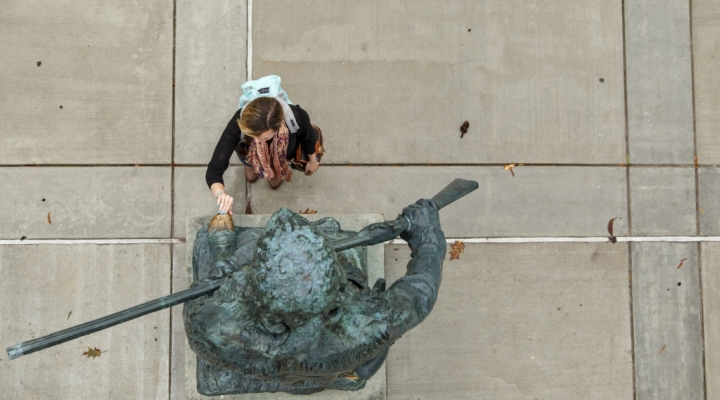Accommodations and Interim Measures

If, in the judgment of the Title IX Coordinator or the Office of Institutional Equity, the safety or well-being of any member(s) of the campus community may be jeopardized by the on-campus presence of the accused individual, the Title IX Coordinator, the Office of Institutional Equity, or their designee may provide or recommend interim remedies intended to address the short-term effects of Harassment, Discrimination, and/or Retaliation (i.e., to redress harm to the victim and the community and to prevent further violations).
Interim Remedies for Students: Interim remedies available to students may include but not be limited to the following:
- Referral to counseling and health services;
- Education to the community;
- Alteration of the housing situation of an accused student;
- Alteration of the housing situation of the victim if desired;
- Implementing contact limitations between the parties;
- Offering adjustments to academic deadlines and course schedules; and
- Other remedies appropriate to each individual situation.
Interim Remedies for employees: Interim remedies available to employees may include but not be limited to the following:
- Referral to the Employee Assistance Program;
- Education to the community;
- Alteration of the housing situation of an accused resident employee;
- Alteration of the housing situation of the victim resident employee if desired;
- Implementing contact limitations between the parties;
- Offering adjustments to academic deadlines and course schedules; and
- Other remedies appropriate to each individual situation.
Additionally, Eastern Kentucky University may temporarily suspend or place on leave a student or employee pending the completion of investigation and resolution. The following procedures apply to the imposition of temporary leave or suspension.
Temporary Suspensions of Students:
The nature of the policy must present a clear and present danger of harm to the victim, to any other member of the University community, to University property, or to University activities.
Prior to the imposition of any temporary suspension, or as soon thereafter as practicable, the student will be given the opportunity to meet with the Title IX Coordinator or other Office of Institutional Equity staff to demonstrate why the suspension should not be implemented.
The Title IX Coordinator or Director of OIE have sole discretion to implement or stay a temporary suspension or leave under this policy, and to determine its conditions and duration. Violation of a temporary suspension or leave under this policy will be grounds for expulsion or termination.
During a temporary suspension, a student may be denied access to University housing and/or to the University’s campus, facilities, or events. As determined by the Title IX Coordinator,Office of Institutional Equity, or their designee, this restriction includes classes and/or all other University activities or privileges for which the student might otherwise be eligible. At the discretion of the Title IX Coordinator, Office of Institutional Equity, or their designee, alternative coursework options may be pursued to ensure as minimal an impact as possible on the accused student.
Temporary suspensions may be enforced only until final disposition of the case has been made by the appropriate University official or hearing entity and may not to exceed a period of five class days.
Temporary sanctions based on the “clear and present danger” principle upon the recommendation of the Title IX Coordinator or the Director of OIE and approval of the President may be continued during the period of appeal to the Student Life, Discipline, and Athletics Committee of the Board of Regents.
In all cases, students accused of violating University regulations will be informed of their rights, including avenues for appeal of a decision, and the right not to testify against oneself.
Temporary Paid or Unpaid Leave for Employees:
In the event that the employee is accused of a violation which also constitutes grounds for immediate dismissal, as defined in the Progressive Disciplinary Action Policy (Policy 8.3.4R), the Title IX Coordinator or the Director of OIE may place the employee on unpaid leave until such time as the complaint is resolved.
In the event that the violation does not constitute grounds for immediate dismissal, but the continued presence of the employee is disruptive to the work environment, the Title IX Coordinator or the Director of OIE may place the employee on paid leave pending resolution of the complaint.
Prior to the imposition of any temporary suspension, or as soon thereafter as practicable, the employee will be given the opportunity to meet with the Title IX Coordinator, or Office of Institutional Equity to demonstrate why the suspension should not be implemented.
The Title IX Coordinator or the Director of OIE have sole discretion to implement or stay a temporary paid or unpaid leave under this policy, and to determine its conditions and duration. Violation of a temporary leave under this policy will be grounds for expulsion or termination.
During temporary paid or unpaid leave, an employee may be denied access to University housing and/or to the University’s campus, facilities, or events. As determined by the Title IX Coordinator, Office of Institutional Equity, or their designee, this restriction includes classes and/or all other University activities or privileges for which the employee might otherwise be eligible. At the discretion of the Title IX Coordinator, Office of Institutional Equity, or their designee, alternative coursework options may be pursued to ensure as minimal an impact as possible on the accused employee.